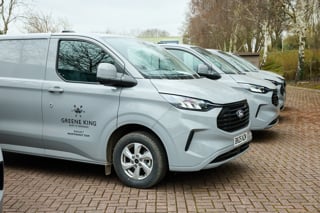Over the past 12 months Zenith says it has seen significant growth in new cars under its management, through a combination of a move back into cars from cash takers, salary sacrifice car orders and new customers wins.
When company car tax was changed in 2002 to a system based on CO2 emissions, for some drivers it became more desirable to take a cash option rather than a company car.
However the market has adapted and the move to the CO2 emission-based banding has been highly successful in reducing average emissions and increasing company car sales.
Since 2001, average CO2 emissions for new company cars have fallen by nearly 20%. This is largely due to emission reduction targets on manufacturers and to the cost efficiencies achieved by drivers who select low emission cars.
As well as the Benefit in Kind tax benefits advantages of driving a new lower emission vehicle, the average age of a car on the road in the UK is over seven years old, says Zenith. It is therefore likely to have higher CO2, fuel consumption and maintenance costs than the new generation of vehicles.
In addition to lower Benefit in Kind tax payments on these vehicles, employees who opt for a company car can also benefit from lower fuel costs and maintenance costs.
Zenith says the new, lower emission, high powered vehicles have been very attractive to the fleet market, helping to reduce emissions of company cars to a lower level than those sold privately.
Traditionally companies have struggled to encourage employees to take lower emission cars however, in 2010 the average emissions for company cars fell below those of private cars.
The average CO2 of a company car ordered in 2010 was 143.8g/km, compared to the average for new cars bought privately, at 144.8g/km. Zenith has seen this downward trend and in the last 24 months the average CO2 emissions for company cars on the Zenith fleet fell by 10g/km.
During the recession when private sales (often seen as a good indicator of the state of the economy) have suffered, the fleet market, although impacted, has bounced back more quickly.
The number of company car drivers is growing, and, according to figures from the SMMT, whereas private sales have dropped in 2011 up to November, compared to the previous year, fleet sales have increased by 7.5%.
Drivers are swapping their privately owned vehicles for a newer company car, through either a traditional company car scheme or a salary sacrifice arrangement, says Zenith.
Salary sacrifice is helping the reduction in overall emissions by attracting a new breed of company car drivers. Typical cars chosen are the lower emissions ones, which attract the best savings.
The opportunity to have fixed costs, protected from market fluctuations, for example in insurance and maintenance, and the easy budgeting is highly appealing; whilst helping companies to provide their employees with safer, lower emitting cars.
The employer also benefits from employees moving into company cars. An older privately owned vehicle may not have the right insurance cover, have a valid MOT or be roadworthy and the employer has a legal responsibility for ensuring the safety of the driver whilst driving on business.
Zenith says companies are becoming more aware of their duty of care and environmental responsibilities, as well as the opportunity to making cost savings which they can achieve through a company car scheme.
Each year since 2002 the Benefit in Kind tax bands have been reviewed in order to continue the incentive into lower emission vehicles and, the level which attracts the lowest rates, is gradually being reduced.
Manufacturers are keen to keep ahead of the trend and produce more vehicles with sub 100g/km and sub 110g/km emissions, which in turn is helping to increase the number of lower emitting vehicles on the road.
Whilst the retail car market has continued to struggle throughout the past year, the company car market has performed well. This is good news for the manufacturers, the leasing industry, the environment, the Government through tax revenue and emission reduction, and the economy as a whole.





















Login to comment
Comments
No comments have been made yet.